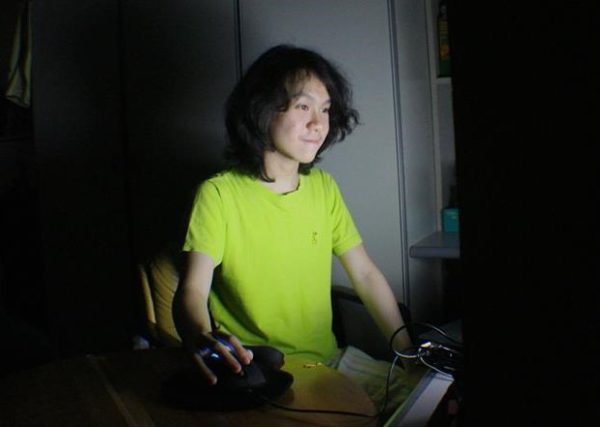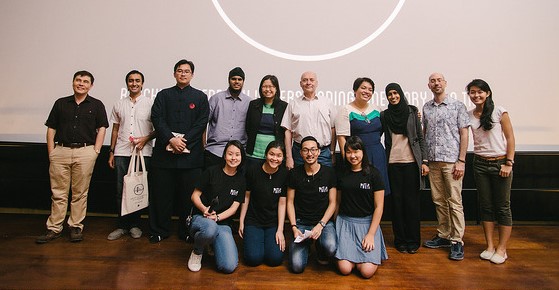This is a commentary by the Humanist Society (Singapore) addressed to both supporters and critics of Amos’ arrest.
The arrest of Amos Yee on charges of wounding religious feelings has caused much debate over the freedom of expression in Singapore. The 17-year-old is known for creating and posting online videos mocking Christianity and Islam, using religious symbols such as the crucifix, Bible and Koran in his latest videos. The arrests arise from Singaporeans filing police reports against Amos. He is now charged with various offences, including Section 298a of the Penal Code for the alleged offence of wounding religious or racial feelings with deliberate intent.
Amos’ arrest has attracted international attention. The latest incident has been mentioned on the Richard Dawkins’ Foundation for Reason and Science web page, Lawrence Krauss’ Facebook fan page and most recently, in Dave Rubin’s recent show. Amos has even caught the attention of the Hong Kong media and Hong Kong youth activist Joshua Wong. Amos’ case is held up as yet another example of how Singapore’s laws harshly restricted the freedom of expression.
As an organisation of atheists, agnostics and humanists in Singapore, the Humanist Society (Singapore) has been concerned about the implications of Amos’ conduct and his subsequent arrests. We would like to point out that the case of Amos Yee is a unique and difficult matter, more complex than many international humanist and atheist thinkers may realise. The Society and our members have discussed at length, the implication which Amos’ arrest may have on freedom of public discussion in Singapore, and how we can help him. Last December, we pointed out in a letter that verbal threats of violence towards Amos did not receive the same treatment by the police towards Amos. We also spoke about the increasing trend of some people filing police reports as a form of “vigilante justice” on social media.
Yet, as Amos’ case gathers international attention, we would like to set things in perspective for both supporters and critics of Amos’ arrest.
To the supporters of Amos’ Arrest
Supporters of Amos’ arrest have argued that religious feelings must be respected for the sake of racial and religious harmony. This position has a lot of support within Singapore, as many citizens have been taught in local schools of the damage done by the race and religious riots here in 1950 and the 1960s. It is common, for example, for Singaporeans to speak up against attempts to offend religious feelings, even when they do not belong to the religious group which is being insulted. Many citizens see efforts to “catch” offenders of religious feelings as a public duty.
However, we would like to warn of the emergence of “deliberate takers of offence.” As the most outspoken videos by Amos go viral, preliminary observations of the shares reveal that many individuals who share the videos are also the ones who claim to have been offended. The question is, why would people offended by Amos’ video help in spreading them? Wouldn’t that fan the flames and further spread the offensive language in the video?
There is a saying: “It takes two hands to clap”. In a neighbouring country, Malaysia, there has been an alarming rise in intolerance towards minorities. Forms of expression that were previously not offensive to a religious group for decades, has become increasingly offensive in recent years. Is this the case of people becoming more disrespectful of religious traditions and speaking out against them? We believe this is not the case. What we are seeing, is a concerted agenda by certain people or groups, exploiting existing laws to advance their agenda and to stifle public discussion.
If “deliberate takers of offence” become commonplace, they will harm Singapore’s pluralism in the long run. Due to their claims to “victimhood”, their reactions – even when there are threats to violence – appear to be let off by the public. However, sharing these videos allows deliberate takers of offense to create an “enemy”, mobilise their community and whip up feelings of solidarity against the perceived source of “offence”. This leads to more insularity and hampers integration efforts in Singapore.
Singapore is becoming a more diverse society. When people have differing opinions, some opinions could be offensive to others who do not share such views. However, this is a price we must all pay in when living in a multicultural, multi-religious society.
By Singaporean standards, Amos may be an extreme case of offending religious feelings. But in reality, inter-belief and inter-religious discussions are already prevalent in our day-to-day lives, due to the rise of the internet. Filing police reports may only assuage a temporary burst of anger, not improve the quality of public discussion within our society. In fact, generating too much fear of offending a community leads to self-censorship over necessary discussions to negotiate differences in beliefs and ritual practices.
The idea that one’s views or beliefs should forever be shielded from criticism, analysis or ridicule will not make Singapore a more mature society. While the rule of law is to be respected, the authorities should be involved if the discussion poses a clear and immediate danger of physical harm to or sustained harassment to persons. Discussions, in general, should be based on fact, rationality and civility, without resorting to the higher authorities to mediate or intervene.
To the supporters of Amos’ release
The fact that Amos was arrested for wounding religious feelings will be disheartening to those hoping for more freedom of speech in Singapore. The Humanist Society, too, aspires towards a society with freedom of expression and a competitive marketplace of ideas. We are concerned about how certain laws, such as the Sedition Act and s298a of the Penal Code, cater to the lowest common denominator i.e. by suppressing all speech which may be “offensive”. However, to portray Singapore as a highly oppressive state where non-religious people are persecuted is an exaggeration. Singapore is simply not in the same league as countries where open displays of apostasy or atheism are punishable capital offences.
In Singapore, there are many spaces to discuss sensitive topics such as race and religion. It happens daily at think tanks, interfaith dialogues and mediation led by community leaders. These discussions are appreciated for their role in mitigating the country’s fault lines and countering religious extremism. Local humanists have started to participate in these discussions and make our presence felt in the wider society.
Photo above: Our founding President Paul Tobin (standing, far left) taking part in a interfaith dialogue with youth religious leaders in 2015.
On the Internet, the Humanist Society regularly shares videos and posts on our Facebook wall including academic criticisms of religion. A walk into Singapore’s libraries and bookstores and people can find criticism of religion by Richard Dawkins’ The God Delusion, widely considered as offensive to many religious people here. One may also find books by Ayaan Hirsi Ali which are critical of Islam.
Unlike Amos, volunteers at the Humanist Society (Singapore) have yet to be charged with any offence. Neither have the bookshops selling books by Dawkins and Ayaan. This is despite the fact that the same laws that apply to Amos, our Society, and the bookstore owners. We have to emphasise this point to dispel any irrational fear of anti-freethinking repression here, especially for international humanist and atheist speakers visiting Singapore in the future.
Such spaces for criticism of religion and other humanist and atheist discourse are kept alive through a better understanding of Singapore’s existing laws regulating public speech. These laws target intentions to conduct subversion and sedition. Clearly, this does not apply to the vast amounts of atheist and humanist literature being sold in Singapore. The bulk of such literature is academic, aimed at educating people and improving the human condition, and not seeking attention for attention’s sake.
What can we do?
We appreciate the concern that international humanist and atheist groups have for Singapore and Amos. However, these issues cannot be solved by merely arguing for free speech. Our suggestions for the humanist and atheist community:
- While raising Amos’ case abroad, have an awareness of the complexity and the nuances involved in Singapore, including our demographics, geopolitical context and history. This will help to provide better-informed arguments for freedom of expression.
- Help to point out “deliberate offence takers” who exploit laws, originally designed to promote peace between communities, to silence their critics.
The space to discuss religion and humanism is alive and well in Singapore. In fact, many non-religious people from troubled parts of Asia have found refuge and love here. The laws that led to Amos’ arrest were known to us long before. Our way of thriving under the current restrictions is to have even more reason, more evidence-based views, and more compassion. Essentially, be more humanist.






